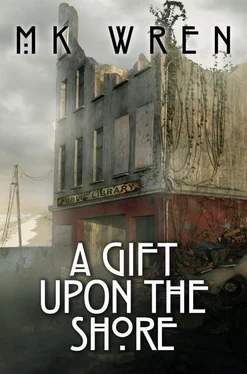I go to bed again at dawn and don’t rise for breakfast. Bernadette comes in before breakfast to see me, frowns irritably when I tell her I didn’t sleep well again last night, and declares that she will prepare one of her potions for me tonight. Then she informs me that she has fed the cats and dogs and asks if I want to be called later. I tell her to call me in two hours, in time for school. When she leaves, I wonder how much Bernadette has grasped of this game Miriam and I are playing. The medicine she offered to prepare for me tonight is not a soporific. I asked her specifically, and I’ve never known her to lie.
Today school is an ordeal exacerbated by Stephen’s silence. There is an accusation in it, and my defenses are failing. I find myself repeatedly on the verge of tears, incapable of concentration, and in my burning eyes the shapes of my familiar world become alien and vaguely frightening. Today I feel Miriam behind me constantly, staring at me with that knowing smile. Yet when I look around, she is seldom there.
After midday meal I start for the beach path with Shadow, but I see Bernadette in the patch of elephant garlic at the southwest corner of the house. She motions to me to come over, then leans on her hoe amid the furled flower heads, already a yard high, bobbing in the wind on their long stalks. “I heard an interesting thing this morning, Mary.”
“What, and who did you hear it from?”
“Grace. Silly old fool. No sense at all. She said she’d heard that something terrible was going to happen soon.”
I feel myself stiffening, try to mask it with a smile. “Wasn’t she more specific?”
Bernadette bends toward me, her tone mockingly ominous. “God is going to punish the wicked.”
“Really? Well, that’s good news.” So Miriam is preparing for her act of god with a bit of prophesying.
Bernadette’s bright eyes glint. “Good news. So it is. I never noticed that God was very quick to punish the wicked in the past.” And she returns to her weeding, dismissing me, apparently, from her mind.
As I walk down the path to the beach I wonder if I’ll ever understand Bernadette’s religion or philosophy or whatever she calls it. In spite of that vein of cynicism that occasionally surfaces, she goes through all the motions of a believing Christian, and I don’t think she’d bother if they weren’t meaningful to her.
Today I am going to the beach—and staying there. I walk south with Shadow, who generally moves at a full run. It’s refreshing to watch her, refreshing to feel the astringent wind at my back, to feel the heat of the sun, its reflection in the water-slick sand preceding me, dazzling my eyes.
I walk for about half a mile; far enough so that no one at Amarna can see what I’m doing. The first task today is to test Shadow near the ocean to see how far away she can be from me and still hear the whistle over the surf. I tether her to a log, then walk farther south, hide myself in the drift, and blow on the whistle. And I can hear her barking. When I’ve increased the distance to a thousand feet—I judge the distance by counting the ruined houses on the bank; they were built on hundred-foot lots—I add a new element to the exercise.
After I tie the leash to another log, I loosen the collar so it will slip over her head if she pulls at it. I order her to stay, walk down the beach past ten lots, then hide behind the scrolled screen of a derelict tree’s roots. When I blow on the whistle, I hear Shadow barking, faintly at this distance, and I keep blowing. And hoping.
She doesn’t disappoint me. Finally I see her running toward me. I don’t show myself, but she doesn’t need to see me as long as she can hear the whistle. When she has covered half the distance, I stop blowing. She hesitates, barks disconsolately, then begins weaving along the sand, nose down, until she picks up my scent, and when that leads her to me, she dances and barks, while I hug her and offer enthusiastic praise. I repeat this test four times, increasing the distance until I reach two thousand feet, and every trial is a success.
Satisfied, and exhausted with all my tramping up and down the beach, I make my way back to Amarna in stages, resting now and then, even napping in the dry, pale sand near the bank with my back against a burnished log, the sun hot on my aching joints. I’m in no hurry to return to Amarna. Yet I must finally. Shadow trots ahead of me, sniffing at the flotsam thrown up by the last tide. As I approach the path to the house a numbing anger grows within me that I should feel reluctant to return to my own home. It seems a long climb.
Through the evening meal, I am even more acutely aware of the tension underlying every word, of the veiled, accusing looks directed at me. I want to shout, “This is not my fault!” But I say nothing. After supper, while the family is at evening service, I take a bath, then stoke up the fire in the living room and settle in for another vigil.
This is the worst night. My body defies my intentions; my mind shimmers toward dreams, toward hallucination. The flickering light of the fire vibrates, and phantom shapes emerge from the dark. I slip in and out of sleep, and again I keep Shadow beside me, under my hand.
And again the basement door opens, once soon after midnight, the second time after four. I’m almost convinced that I hear soft laughter.
At five I go out to the deck. Another clear day. The moon hangs in the pastel wash of mist and sky, so nearly a perfect disk, my old eyes can’t discern the slight flaw in perfection. But it isn’t full yet.
Tomorrow night it will be full.
I don’t bother to go to bed. I’m afraid to, afraid I might sleep through breakfast, and I am determined to make an appearance today at the morning meal. I let it be known then that I don’t feel well, and the family’s faces are mirrors attesting to the fact that I don’t look well. For the first time since our final lesson I see something in Stephen’s eyes other than accusing doubt.
And Miriam watches me, smiling that knowing smile. I wonder if no one else sees it.
Half an hour after school begins, I collapse, fall out of my chair amid the children’s cries of alarm. They are convinced, and so are the adults when they come in response to the children’s shouts. Jerry carries me to my room, then Bernadette takes over, sends everyone away. She’s brought her medical case, and she listens with the stethoscope to my heart, checks my blood pressure with the old sphygmomanometer. She asks if I hurt anywhere. I shake my head. Then she prepares one of her teas—swearing irritably that it’s only a combination of willow bark and foxglove, that there is nothing remotely resembling a soporific in it. Obviously I don’t need a soporific now. I just need sleep.
And sleep I have—a day of sleep, sweet sleep to knit up my raveled sleave. This is also part of my preparation.
The cast of the light in the windows serves as my clock, and I know it’s evening when Bernadette comes in with a tray: a bowl of chicken broth and a cup of tea. She checks my vital signs, frowning absently, then props pillows behind me and puts the tray on my knees.
I ask, “What time is it?”
“Suppertime. So, have some of that broth. No—the tea first.”
I drink the tea, knowing I need the medicines that give it such a bitter, earthy taste. I take a few spoonfuls of the broth, and I am in fact ravenous, but I drop the spoon, let it clatter against the bowl, let my head fall back, my eyes close. “I’m… not hungry….”
“Eat it anyway,” she retorts, then with a sigh, “All right. I’ll leave it so you can have some later. Cold.”
She puts the bowl on the bedside table, removes the tray, then sits down beside me, presses her fingers to my wrist. “Pulse still a little fast. Thought you might be having a heart attack this morning. You could, you know. Blood pressure runs high. You’ve got poor Jeremiah going like a weather vane. Doesn’t know what he should think.”
Читать дальше












